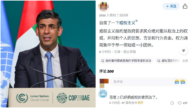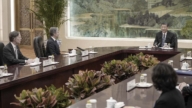【新唐人2011年2月7日讯】埃及反政府示威浪潮持续不断,总统穆巴拉克已宣布将不再谋求连任,独裁的执政党执行委员会2月5号集体辞职,副总统苏莱曼与多名反对派领袖和军方高层对话,商讨政权过渡安排。埃及正在进行的废除专制转型过程,将对和平解体中共产生启示作用。
埃及执政党“国家民主党”执行委员会5号集体辞职,其中包括穆巴拉克的儿子贾迈勒以及党总书记谢里夫。改革派人物巴德拉维被任命为新的总书记,但是他仍然与穆巴拉克统治家族关系密切。
与此同时,成千上万的示威者继续聚集在首都开罗的解放广场,坚持要穆巴拉克下台。许多抗议者认为,执政党改组领导层只为改善形象,只实行表面的民主改革,根深蒂固的权力垄断则一成不变。
美国特使威斯纳表示,穆巴拉克的执政党高层辞职下台,是埃及实现政治转变的“积极的一步”。他说,目前穆巴拉克留任至关重要,来主导民主过渡的改革措施。
这是埃及反政府示威以来,美国官员首次表态支持穆巴拉克留任总统。但是美国国务院表示,威斯纳是以私人名义发表这番评论的。
5号,美国国务卿希拉里表示支持埃及由副总统苏莱曼领导政治过渡,她说,国际社会对这一过渡的支持,对于防止极端主义份子劫持埃及政治过渡极为重要。
而领导“全国变革联盟”的改革派领袖、诺贝尔和平奖得主巴拉迪则说,如果美国支持穆巴拉克或者苏莱曼领导的大选前过渡政府,那将是“巨大的倒退”。
副总统苏莱曼5号开始,陆续约见包括“穆斯林兄弟会”等反对派多名领袖以及军方高层,提议穆巴拉克放弃行政权力,成为“挂名”总统,由苏莱曼领导过渡政府与反对派协商,推动修改宪法和自由公平的总统选举。
这项提议遭到穆巴拉克和总理沙菲克的反对,尽管穆巴拉克新任命的首位副总统苏莱曼一直是他的亲密朋友。苏莱曼是前情报局局长、陆军中将,埃及官员否认苏莱曼险些遇刺的消息。
穆巴拉克3号接受美国广播公司采访时说,当这个国家的领导人让他受够了,很愿意现在就离职,但是如果这样做,他担心埃及会陷入更严重的混乱。
5号,埃及西奈半岛一条通往以色列的天然气管道发生爆炸。埃及国家电视台指称,爆炸案是由恐怖份子所为。
2号和3号在开罗,穆巴拉克的支持者与抗议群众发生暴力冲突,对群众以开枪、燃烧弹、棍棒袭击,造成至少9人死亡、1500多人受伤。总理沙菲克在电视上为暴力事件道歉。
法国国际广播电台前中文部主任吴葆璋:“2月2日到3日守在解放广场的民众,48小时赤手空拳抵御当局组织雇佣的打手清场的企图,那种义无返顾、誓死抗争到底的精神真是惊天地、动鬼神!”
据联合国公布,约有300人在埃及各地连日来的示威事件中死亡。记者无疆界组织指出,约有60名记者受到攻击。
4号,美国总统欧巴马在与加拿大总理哈珀的联合记者会上,敦促穆巴拉克立即开始有序的权力过渡,不要镇压和采取暴力。
欧盟27国领导人在4号的峰会上,呼吁埃及现在就启动民主过渡,并暗示如果继续发生侵犯公民权利的事件,欧盟会考虑减少对埃及的经济援助。
中共当局继续严控媒体网络舆论,官方媒体主要关注示威活动造成的社会混乱。《人民日报》社论为独裁专制辩护说,示威者中有些人是反对政府,有些人是希望提高工资和福利待遇,另有许多是犯罪份子。
山东大学退休教授孙文广:“最早是突尼斯,后来就是埃及,现在还有也门等一些国家都出现了民众上街、集会,对这种体制进行抗议,要求总统下台,要求解散政府,这完全是一种正义的行为,是一种民意的表达。这个事情应该给中国的政府、中国的当权者敲了一个警钟。”
时政评论家曹长青反思八九天安门运动指出,埃及的示威民众目标非常明确,就是要独裁者穆巴拉克下台。而天安门运动的诉求相当低,当时的主要口号是“反腐败”,没有挑战共产党独裁政权合法性的意愿。
前新华社资深记者吴葆璋:“这次突尼斯和埃及民众的抗争有一个突出的特点,那就是,他们首先冲击的目标正是两国独裁政党的党部,没有把党国混为一谈,共同的目标是改换政权。”
曹长青表示:埃及的这场人民反抗运动,绝不会像中国的八九民运那样,最后仍然是共产党统治,仍是政府暴力,而是会像埃及异议作家阿默(Kareem Amer)在《华尔街日报》发表的文章标题所说:“埃及永远不会再依旧”。
新唐人记者常春、李元翰、周天报导。
With the anti-government waves heightened in Egypt,President Mubarak announced not to seek re-election.His party’s executive committee resigned on Feb. 5.Vice President Suleiman held talks with several opposition and military leaders, discussing arrangements for the power transition. This ongoing process to abolish dictatorship will be an inspiration for a peaceful disintegration of the CCP.
The ruling National Democratic Party’s executive committee resigned on Feb. 5, including Mubarak’s son Gamal and secretary general al-Sharif. Hossam Badrawi, a reformer, is now secretary general,but he still has close ties with the Mubaraks.
In the meantime, tens of thousands of protesters continue gathering on Cairo’s Liberation Square, insisting on Mubarak’s resignation. Many protesters believe, the ruling party changed leadership merely for superficial democratic reform.
The deeply-rooted power monopoly did not change.
U.S. envoy Frank Wisner said, the resignation of ruling party’s executive committee is a positive step towards realizing political transformation in Egypt.
He said, “Mubarak’s continued leadership is critical …to show the way orward.”
This is the first time since the protests broke out, that the U.S. officially expressed support for Mubarak. However, U.S. State Department said, Wisner’s comments were “his own” only.
On Feb. 5, U.S. Secretary of State Hilary Clinton expressed support for Vice President Suleiman to lead the political transition. She said, international support for such a transition is important in preventing extremists from hijacking
the political transition in Egypt.
The reformist leader, Nobel Prize laureate ElBaradei said, if the U.S. supports a transitional government led by Mubarak or Suleiman before an election is held,
it would be a huge setback.
Since Feb. 5, Suleiman has been meeting with many opposition leaders and high-ranking military officials. He suggested Mubarak to give up power and to become a nominal president.Suleiman would like to lead the transitional government
to negotiate with the oppositions to revise the Constitution and hold a free presidential election.
This proposal was objected by Mubarak and Prime Minister Shafiq, although Suleiman has been a close friend of Mubarak.Suleiman was ex-head of intelligence and lieutenant general. Officials denied reports of an assassination attempt on his life.
On Feb. 3, Mubarak said to ABC in an interview, he was fed up being a leader of this country, and he was willing to leave the post right away. However, he was worried that doing so would bring Egypt into a more severe turmoil.
On Feb. 5, a natural gas pipeline from Sinai Peninsula in Egypt leading to Israel exploded.The national TV station of Egypt said the explosion was carried out by terrorists.
On Feb. 2 and 3, Mubarak’s supporters and protesters clashed violently in Cairo. His supporters attacked with gunfire, tear gas and truncheons,causing at least 9 deaths and over 1500 injuries. PM Shafiq apologized on TV for the violence.
Wu Baozhang, ex-director of the Chinese division of Radio France Internationale: On Feb. 2 and 3, people on Liberation Square smashed the attempts of the thugs hired by the authorities to clear the scene. Their spirit of persistence and no turning back is heroic and touching.
According to the UN, about 300 died in the protests.Reporters Without Borders said, about 60 reporters were attacked.
On Feb. 4, on a joint press conference, U.S. President Obama and Canadian Prime Minster Harper urged Mubarak to begin an orderly power transition and refrain from suppressing and using violence.
On the Feb. 4 summit, leaders from 27 EU countries urged Egypt to initiate democratic transition. They hinted that if more human rights violations occur, EU would consider reducing financial support to Egypt.
The CCP continues tight control of media and Internet.CCP’s official media mainly focuses on the turmoil.People’s Daily’s editorial defended Egypt’s tyranny,
saying some protestors are anti-government activists, some wish to raise their salaries and benefits, while many others are criminals.
Sun Wenguang, ex-professor at Shandong University:From Tunisia to Egypt and Yemen, people go onto the streets to rally and to protest against the regime.They request the presidents to step down and dissolve the governments, which is a just action
and an expression of the public opinions. This should sound a warning to the CCP authorities.
Cao Changqing, a political commentator, reflected on the Tiananmen Massacre and said, the goal of Egyptian demonstrators is very clear, i.e. to overthrow the tyrannical Mubarak. But the request of the Tiananmen movement was really small, i.e., anti-corruption, withno intention to challenge the legitimacy of the CCP’s rule.
Wu Baozhang: One striking characteristic common to both Tunisian and Egyptian mass uprisings was that they first attacked the ruling parties’ headquarters.They clearly distinguished between party and state, with a common goal of changing the government.
Cao Changqing: The demoncratic movement in Egypt will never be like the Chinese one in 1989, which left the CCP still ruling China with violence. Just as the title of a Wall Street Journal article by Kareem Amer, an Egyptian dissident writer: “Egypt Will Never Be the Same.”
NTD reporters Chang Chun,Yuanhan Li and ZhouTian.





























